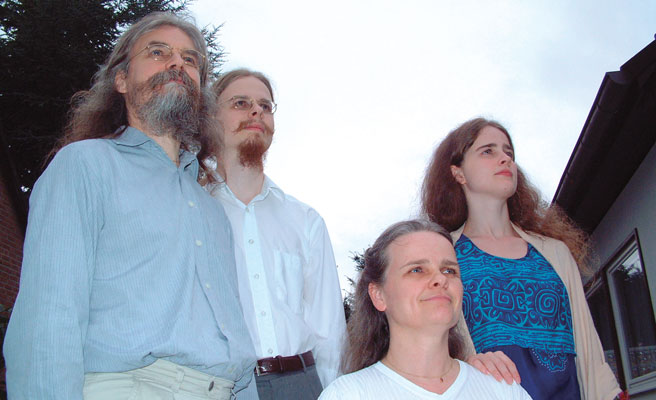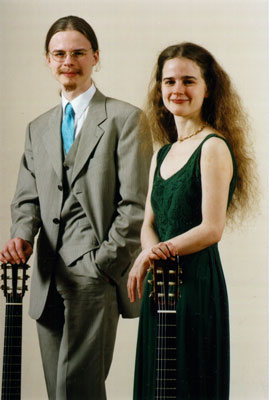| < > |
|---|
| Family Klemke |
Naturgesetz Journal
If one is happy, everything else should be of secondary importance.
... Because Germany has not got a Maharishi School yet, Laura and Samuel Klemke have attended a normal school near Lübeck. In the following interview you can read, how the siblings, that are extremely successful as a guitar duo, judge their development. We have hold the interview with them and their parents Ute and Tobias Klemke.
Photo: UDO CORLEIS
“Nothing is more beautiful than a guitar, save perhaps two”, Fredéric Chopin said. The reason you know at the latest, when you experience Laura (1981) and Samuel (1978) Klemke on their concert guitar. Since their fourth year they are taught the guitar by their father. With five and eight years they appeared on TV for the first time and since then were showered with prizes. At “Jugend musiziert” alone they have won thirteen first prizes as soloists or as a duo. They were successful in more than 300 international stage performances and recordings of radioconcerts. At present they are studying with Prof. Monika Rost in Weimar. The next highlight in a series von many successful concerts will be an appearance in the series “Konzerte auf Henkellsfeld”, that will take place on October, 25th in Wiesbaden. www.klemke.de
photo: CLAUS BACH
Laura and Samuel, what is the secret of your success?
SAMUEL: The most important thing was first, that our father practiced the guitar at home every day, and second, that we got daily lessons since the age of 4 years.
Twenty years of practice also means twenty years of keeping to it. Where does the motivation come from?
LAURA: In the beginning we could not get enough. We were not allowed to practice as much as we wanted. So we looked forward for the next day. This way were the first years. And then practicing was part of the day like eating or brushing one's teeth.
And what goes to make an artist?
TOBIAS: The man lives to be happy. For me the way to happiness led to Transcendental Meditation. But in addition I had to make music. I thought, that I become happy by it. But actually I became happy by the transcendence, not by music. Therefore I thought, that a newly born man, when I give him from the very beginning, what he really wants, namely to be happy, and when he produce it for himself, then eveything else what he does should be of secondary importance. The means to be happy they bring with them.
In many biographies of artists you can read, that the way to happiness was the art. All nonsense?
TOBIAS: I do not beliebe in it. We have given the TM to our children. With it they hat the most important technique to avoid problems, to get along with stress and to be happy. And it was my wish, that our children become artists, musicians. I thought, we try it, and when it does not work, we let go.
Does the guitar-playing develop to a job?
LAURA: Actually it still is rather a hobby than work. Of course we have to work on the pieces of music, for example before a concert, but for both of us it is rather a feeling of beeing a hobby; it has nothign to do with strain.
How much time have you practiced while you attended a school?
LAURA: Not more than an hour per day.
TOBIAS: Publicly you can say this hardly. Nobody believes, that we do not practice four hours at least. Three, four concert-programmes played by heart, that is not possible.
LAURA: It depends on how you pracice. You can achieve the same in one hour, for which others need four perhaps.
SAMUEL: And besides it our brain is quick on the uptake and can learn easily. What could be the reason for it?
UTE: The children grew up with TM. To them it was naturally, to make quick progress withouth effort from the very beginning.
SAMUEL: In school I noticed that other pupils swotted alot, to get good results.
Your have been a good student?
SAMUEL: Abitur-mark 1
And you, Laura?
LAURA: My mark in the Abitur is 1,9. I always found it very easy to learn.
More and more parents take to court the teachers of their children, for they think, that the marks are not correct. What is your opinion?
TOBIAS: You can imagine, that we could make a lot suggestions of improvement to the schools as well as to the teachers. But first we have asked us: What can we do at home? You have to get your teeths into it, react sensitively to the children's questions, give them explanations and act as spotter for them. Our children hat a good time in school and we have never heard them speaking ill of the teachers. They just took things as they came.
UTE: If children and teachers accept each other how they are, that is a good condition. The children, too, have to learn being tolerant.
SAMUEL: If a child hears his parents talking bad about the teachers, the next question would be: What can I learn from them?
What could be made better in German schools? Could TM be helpful in the lessons?
SAMUEL: Probably, for the problem are the schools much lesser than the people going there. There is too little learning capability and too much distraction. The larger towns have pupils with worse notes than the pupils from rural areas. There must be something wrong with the powers of concentration.
LAURA: Perhaps it is also up to the size of the schools and classes. Also I think, that the teachers should look after the single pupil much more. Especially after the weaker and those, who are demanded too little.
UTE: I also do not like that pupils have to repear a year. It is normal that children have difficult phases, but if they have support at home, they will manage to get through it.
TOBIAS: My parents were divorced. And with what did I occupy myself during school-time? With the problems of my parents. With things that do not belong to the mind of a child. During my studies became socially involved a lot and I have realized: If youths have problems, usually the relationship between the parents was in disorder.
Should problems always be kept away from the children? Some time they are thrown back back on their own resources.
TOBIAS: Keeping away does not mean that there are no problems. The matter is to set them an example to and how to solve the problems. We always have talked with our children about it.
UTE: I also believe that it is impoprtant, that not both parts of the parents go to work as long as the children grow up. At least one should be there always. Of course, children can get used to everything, but it burdens them.
Headword: Children's competence to solve problems, have you reached your goal?
TOBIAS: (to his children): Can you solve your problems on your own?
SAMUEL (laughs): Do we have problems?
Since when do you practice Transcendental Meditation?
LAURA: Since I can think.
TOBIAS: The children came into the world and were welcomed with a birth-mantra. A beautiful thing, that was available from Maharishi formerly.
SAMUEL: And then how it is planned. First the technique for children, at the age of ten the technique for adults, with fourteen we got the TM-Sidhis and with sixteen years be learned the yogic flying.
How did that had an effect on your musical development?
SAMUEL: TM is good for the co-ordination between body and mind. But the Transcendental Meditation forms the whole personality and the creativity as well. One makes out, what you want to express with the musik and one can realize these ideas.
How do you plan your future?
LAURA: We aspire to the artistic degree, after it high level studies leading to the concert exam. Parallel to it we will give concerts. We want the music to be our profession and in it we want to get to the front.
UC

